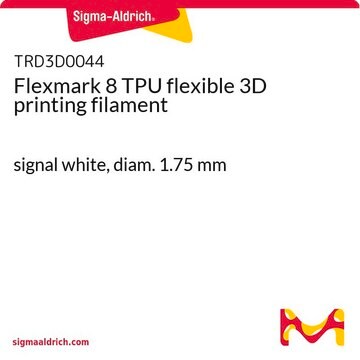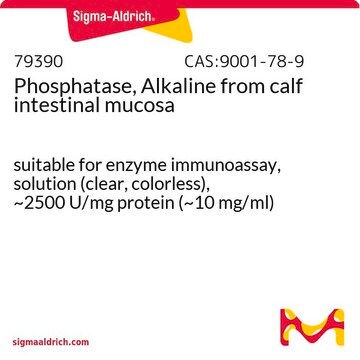P6774
Phosphatase, Alkaline from bovine intestinal mucosa
buffered aqueous solution, ≥2,000 DEA units/mg protein
Synonyme(s) :
Alkaline phosphatase, Orthophosphoric-monoester phosphohydrolase (alkaline optimum)
About This Item
Produits recommandés
Source biologique
bovine intestinal mucosa
Niveau de qualité
Forme
buffered aqueous solution
Activité spécifique
≥2,000 DEA units/mg protein
Poids mol.
dimer ~160 kDa
Concentration
5-20 mg/mL
Température de stockage
2-8°C
Vous recherchez des produits similaires ? Visite Guide de comparaison des produits
Catégories apparentées
Application
Actions biochimiques/physiologiques
Propriétés physiques
Définition de l'unité
Forme physique
Notes préparatoires
Remarque sur l'analyse
Inhibiteur
Mention d'avertissement
Danger
Mentions de danger
Conseils de prudence
Classification des risques
Resp. Sens. 1
Code de la classe de stockage
10 - Combustible liquids
Classe de danger pour l'eau (WGK)
WGK 2
Point d'éclair (°F)
Not applicable
Point d'éclair (°C)
Not applicable
Équipement de protection individuelle
Eyeshields, Gloves, multi-purpose combination respirator cartridge (US)
Certificats d'analyse (COA)
Recherchez un Certificats d'analyse (COA) en saisissant le numéro de lot du produit. Les numéros de lot figurent sur l'étiquette du produit après les mots "Lot" ou "Batch".
Déjà en possession de ce produit ?
Retrouvez la documentation relative aux produits que vous avez récemment achetés dans la Bibliothèque de documents.
Les clients ont également consulté
Protocoles
Enzymatic Assay of Alkaline Phosphatase, Diethanolamine Assay (EC 3. 1. 3. 1)
Notre équipe de scientifiques dispose d'une expérience dans tous les secteurs de la recherche, notamment en sciences de la vie, science des matériaux, synthèse chimique, chromatographie, analyse et dans de nombreux autres domaines..
Contacter notre Service technique







